初中英语句型用法汇总
初中英语中考常考固定短语句型汇总(共80个)

中考英语常考固定短语句型1.much,a little, even, still等表示程度的副词可用来修饰比较级;而very, too, so, quite(表示身体健康的quiter除外)习惯上不用来修饰比较级。
2.arrive in +大地点/ arrive at +小地点= get to … = reach +…(到达…)We have arrived at the railway station.3.Let's +动词原形4.长,宽,高的表达法:数字+量词+形容词。
如:20 metres wide二十米宽Well 30 meters deepThis is a two-meter-high tree5.stop doing sth 停止正在做的事情Hearing the knock at the door, Dad stopped his work.6.stop to do sth停下(正在做的事情)来做另一件事Xiao Ming is tired. He stops to have a restWhen the teacher came in, the students stopped talking7.stop sb from doing sth 阻止某人干某事We should prevent/stop people from damaging the ecological environment.Dad always prevents/stops me from swimming in the river8.can't stop doing sth 情不自禁干某事Hearing this sad story, we can't help cryingHearing this joke, everyone couldn't help laughing9.There is +单数可数名词/不可数名词+ 地点状语.10.How many+复数名词+are there+介词短语?How many students are there in your class?11.remember to do sth记得将要干某事(事没做)Remember to lock the door when you leave.12.remember doing sth .记得曾经做过某事(事已做)I remember locking the door when I left.13.在季节、月份、星期、节日、球类运动、棋类游戏的名词之前不用冠词。
初中英语常见常考重点句型汇总(共121个)

初中英语常见常考重点句型汇总一、常见句型(80 个)【句型1】There+be +主语+地点状语/ 时间状语There's a boat in the river.河里有条船。
【句型2】I think “我认为.…” 否定式 I don't think...I think he is a good student.我认为他是个好学生。
I don't think any of them is interesting.我认为他们中任何一个都无趣。
【句型3】too...to..… 太……而不能...He is too young to go to school.他太小了不能去学校。
【句型4】It takes sb some time to do sth“干某事花了某人一段时间”,it是形式主语,后面的动词不定式(短语)才是真正的主语。
It takes him four hours to finish his homework.写作业花费了他四个小时。
【句型5】Though...+主句Though I like writing to my pen-friend,it takes a lot of time.虽然我喜欢给笔友写信,但它要耗费我大量时间。
【句型6】What about...?/How about...? “.…怎么样?”,about 为介词,其后须接名词、代词或 V-ing 等形式What about another cake? 再吃块蛋糕好吗?How about going out for a walk? 出去散散步好吗?【句型7】What's wrong with+sb. / sth. ?此句型相当于What's the matter/trouble with.后+某物作宾语时,意为“某物出什么毛病了?”后+某人作宾语时,意为“某人怎么了?”What's wrong with your watch?你的手表有什么毛病?【句型8】How do you like...?How do you like China?你觉得中国怎么样?【句型9】What do you like about...?What do you like about China?你喜欢中国的什么?【句型10】How+adj. / adv. +主语+谓语 !What a/ an+adj. +n. +主语+谓语 !How cold it is today!今天多冷啊!What a fine picture it is!多美的一幅图画呀!【句型11】had better (not)+动词原形You'd better ask that policeman over there.你最好去问问那边的那个警察。
初中语法知识点总结英语(汇总8篇)

初中语法知识点总结英语(汇总8篇)初中语法知识点总结英语第1篇(一) 感叹句表示喜怒哀乐等强烈感情时用感叹句。
感叹句分为两种,一种以what 引导,一种以how引导。
句尾用感叹号“!”。
用降调。
What a clever boy he is!多么聪明的小男孩啊!How clever the boy is!这小男孩多聪明啊!what 引导的感叹句句型:(1)what + a/an +形容词+单数可数名词+陈述句(主语+谓语)What a beautiful city it is! 这是一个多么美丽的城市啊!What an interesting story she told! 她讲了一个多么有趣的故事啊!(2)what+形容词+复数可数名词/不可数名词+陈述句(主语+谓语) What expensive watches they are! 它们时多么昂贵的手表啊! What terrible weather it is! 这是多么糟糕的天气啊!how 引导的感叹句句型:(1)How+形容词/副词+陈述句(主语+谓语)How hot it is today!今天天气多么热啊!How hard he works! 他工作多么努力啊!(2)How+陈述句(主语+谓语)How he loves his son! 他多爱他的儿子啊!(3)How+形容词+a/an+单数可数名词+陈述句(主语+谓语)How tall a tree it is! 这是一棵多么高的树啊!上述两种感叹句可以互相转换。
What a clever boy he is!→How clever the boy is!What a hot day it is today!→How hot it is today!【注意】what和how引导的两种感叹句,在口语中常用简略式,即省略后一部分(陈述句部分)如:How cold!多冷啊!What heavy traffic!交通多挤啊!比较:感叹句和特殊疑问句感叹句:How busy you are!(陈述句语序)你多么忙啊!疑问句:How busy are you?(疑问句语序)你有多忙?这两种句子的根本区别在于:感叹句后面是陈述句语序,而疑问句的语序要颠倒。
初中英语写作中常见的十二种句型及语法汇总
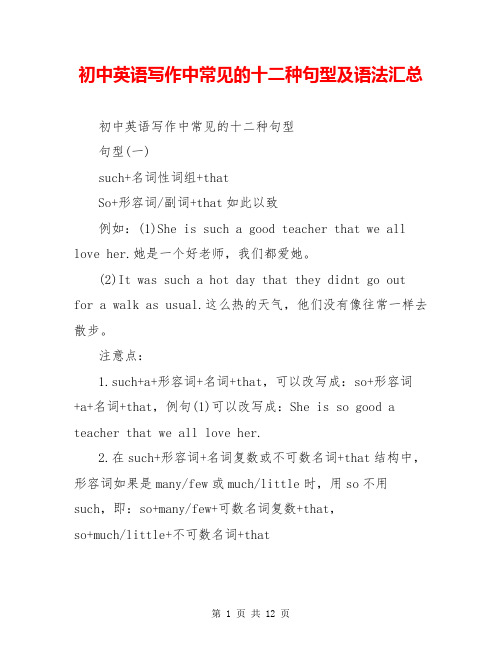
初中英语写作中常见的十二种句型及语法汇总初中英语写作中常见的十二种句型句型(一)such+名词性词组+thatSo+形容词/副词+that如此以致例如:(1)She is such a good teacher that we all love her.她是一个好老师,我们都爱她。
(2)It was such a hot day that they didnt go out for a walk as usual.这么热的天气,他们没有像往常一样去散步。
注意点:1.such+a+形容词+名词+that,可以改写成:so+形容词+a+名词+that,例句(1)可以改写成:She is so good a teacher that we all love her.2.在such+形容词+名词复数或不可数名词+that结构中,形容词如果是many/few或much/little时,用so不用such,即:so+many/few+可数名词复数+that,so+much/little+不可数名词+that(1)There are so many people in the room that I cant get in.房间里人太多,我进不去。
(2)The man has so much money that he can buy a car.那人很有钱,他能买一辆小汽车。
句型(二)There be,eitheror,neithernor,not onlybut also例如:(1)There is a pen and two pencils in his pencil-box.他的铅笔盒里有一支钢笔和两支铅笔。
(2)Not only you but also I have been to the Great Wall.你和我都没有去过长城。
(3)Either you or I am leaving for Shanghai.要么你去上海,要么我去上海。
初中英语:50个必考句型 + 8大时态结构
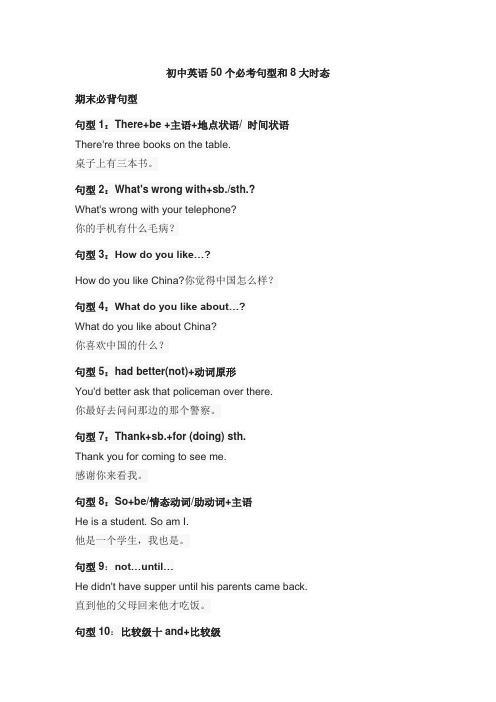
初中英语50个必考句型和8大时态期末必背句型句型1:There+be +主语+地点状语/ 时间状语There're three books on the table.桌子上有三本书。
句型2:What's wrong with+sb./sth.?What's wrong with your telephone?你的手机有什么毛病?句型3:How do you like…?How do you like China?你觉得中国怎么样?句型4:What do you like about…?What do you like about China?你喜欢中国的什么?句型5:had better(not)+动词原形You'd better ask that policeman over there.你最好去问问那边的那个警察。
句型7:Thank+sb.+for (doing) sth.Thank you for coming to see me.感谢你来看我。
句型8:So+be/情态动词/助动词+主语He is a student. So am I.他是一个学生,我也是。
句型9:not…until…He didn't have supper until his parents came back.直到他的父母回来他才吃饭。
句型10:比较级十and+比较级The baby cried harder and harder.那孩子哭得越来越厉害。
句型11:the+比较级,the+比较级The more one has,the more one wants.拥有的越多,想要的越多。
句型12:…as+adj./adv.+as……not as(so)+adj./adv.+as…Last Sunday the weather was not so wet as it is today.上个星期天的天气不如今天的天气潮湿。
初中英语短语句型大汇总

初中英语短语句型大汇总〔英语〔短语〕〕句型是英语学问点的重要考点学问,下面是我给大家带来的初中英语短语句型大汇总,希望能够关怀到大家!初中英语短语句型大汇总1. Its time for sth. 该到做某事的时间了.Its time to do sth.(Its time for sb. to do sth) 该到(某人)做某事的时间了.2. cant wait to do sth. 迫不及待地要求做某事.3. ask (tell)sb. (not )to do sth . 请(告知)某人(不)做某事.4. make/let sb. to do sth. 让某人做某事.5. hear/see/sb. do sth 听见/观看某人做某事.6. had better(not )do sth 最好不做某事.7. Its better to do sth最好做某事8. Its best to do sth最好做某事9. enjoy 宠爱做某事10. finish 结束做某事11. keep 继续做某事12. keep on doing sth. 继续做某事13. carry on 继续做某事14. go on 继续做某事15. feel like 宠爱做某事16. stop to do sth 与stop doing sth 停下来去做某事(与)停止做某事.17. forget/remember to do 与forget/remember doing sth.遗忘/记得去做某事(与) 遗忘/记得曾经做过事.18. keep(precent,stop)sb. from doing sth阻挡/防止/阻栏栽人做某事19. prefer.to 宠爱..胜过20. prefer to do sth. rather than do ath.宁愿做某事,而不原做某事.21. used to do sth.过去常常做某事.22. Whats wong with? ..出了问题(事)?23. have nothing to do with.. 与..无关24. be busy doing sth . 在忙于做某事25. too..to.. 太以致知于不26. so that .. 如此.. 以致知于不27. such..that 如此.. 以致知于不28. It take sb. some time to do sth .某人做某事用了一些时间.29. spend ..on sth.(doing sth.)花钱/时间做某事.30. pay..for sth.花费(钱)买某物.31. What /how about? .怎么样(好吗)?32. would like to do sth .想要/情愿做某事..33. I dont think that我认为不..34. Why not do sth.? Why dont you do sth .?为什么不做某事呢?35. What do you mean by.?你.是什么意思?36. What do you think of ..(How do you like .)你认为.怎么样?37. Mike enjoys collecting stamps . So do I.迈克宠爱〔集邮〕.我也也宠爱.38. The more, the better . 越多越剧好.39. Thanks for doing sth.感谢你做了某事.40. It is said that.. 据说1 (see 、hear 、notice 、find 、feel 、listen to 、look at (感官动词)+ do eg :I like watching monkeys jump2 (比较级and 比较级) 表示越来越怎么样3 a piece of cake =easy 小菜一碟(简洁)4 agree with sb 赞成某人5 all kinds of 各种各样a kind of 一样6 all over the world = the whole world 整个世界7 along with 同一道,伴随eg : I will go along with you 我将和你一起去the students planted trees along with their teachers 学生同老师们一起种树8 As soon as 一怎么样就怎么样9 as you can see 你是知道的10 ask for 求助向要(直接接想要的东西)eg : ask you for my book11 ask sb for sth 向某人什么12 ask sb to do sth 询问某人某事ask sb not to do 叫某人不要做某事13 at the age of 在岁时eg:I am sixteenI am at the age of sixteen 14 at the beginning of 的起初;的开始15 at the end of +地点/+时间最终;尽头;末尾eg : At the end of the day16 at this time of year 在每年的这个时候17 be /feel confident of sth /that clause +从句感觉/对什么有信念,自信eg : I am / feel confident of my spoken English I feel that I can pass the test18 be + doing 表:1 如今进行时2 将来时19 be able to (+ v 原) = can (+ v 原) 能够eg : She is able to sing She can sing20 be able to do sth 能够干什么eg :she is able to sing21 be afraid to do (of sth 恐惧,可怕eg : Im afraed to go out at night Im afraid of dog22 be allowed to do 被允许做什么eg: Im allowed to watch TV 我被允许看电视I should be allowed to watch TV 我应当被允许看电视23 be angry with sb 生某人的气eg : Dont be angry with me24 be angry with(at) sb for doing sth 为什么而生某人的气25 be as原级as 和什么一样eg : She is as tall as me 她和我一样高26 be ashamed to27 be away from 远离28 be away from 从离开29 be bad for 对什么有害eg : Reading books in the sun is bad for your eyes 在太阳下看书对你的眼睛不好30 be born 出生于31 be busy doing sth 忙于做什么事be busy with sth 忙于32 be careful 留神;留神33 be different from 和什么不一样34 be famous for 以出名35 be friendly to sb 对某人友好36 be from = come from 来自eg :He is from BejingHe comes from BejingIs he from Bejing ?Does he come from Bejing ?37 be full of 装满的be filled with 充满eg: the glass is full of waterthe glass is filled with water38 be glad+to+do/从句39 be going to + v(原) 将来时40 be good at(+doing) = do well in 在某方面善长, 擅长41 be good for 对什么有好处eg : Reading aloud is good for your English42 be happy to do 很高兴做某事43 be helpful to sb 对某人有好处eg : Reading aloud is helpful to you 大声朗读对你有好处Exercising is helpful to your bady 锻炼对你的身体有好处44 be in good health 身体健康45 be in trouble 处于困难中eg : She is in troubleThey are in tronble46 be interested in 对某方面感兴趣47 be late for = come late to 迟到eg: Be late for class 上课迟到48 be like 像eg : Im like my mother49 be mad at 生某人的气50 be made from 由制成(制成以后看不见原材料)51 be made of 由制成(制成以后还看得见原材料)52 be not sure 表不确定53 be on a visit to 参观54 be popular with sb 受某人欢迎55 be quiet 清静56 be short for 表**的缩写eg: 陶is short for 陶俊杰57 be sick in bed 生病在床58 be sorry to do sth be sorry for sbeg : I am sorry for you59 be sorry to hear that60 be sorry to trouble sbeg : I am sorry to trouble you61 be strict in doing sth 严于做某事eg : Hes strict in obeying noles62 be strict with sb 对某人要求严格eg: Some students are not strict with them selves 这些学生对自己不严格63 be strict with sb in sth 某方面对某人严格64 be supposed to do 被要求干什么65 be sure 表确定66 be sure of doing sth 对做某事有信念eg: He is sure of winning I am sure of learning English well67 be sure of sth 对做某事有信念eg: Im sure of my head (my teacher 我信任我的大脑(老师)68 be sure that sth 对做某事有信念eg: Im suer that he can pass the test 我信任他能通过考试69 be sure to do sth 确定会做某事eg: We are sure to pass the test 我们确定会通过这次考试We are sure to learn English well 我们确定能学好英语70 be terrified of + 名/动doing 可怕71 be terrified to do sth 可怕做某事72 be the same as 和什么一样73 be used to doing sth 习惯做某事eg: My father is used to getting up early 我爸爸习惯早起He is used to sleeping in class 他习惯上课睡觉He is used to working hard He is used to hard work 他习惯努力工作74 be worth doing 值得做什么75 be(feel) afraid to do sth 可怕做某事be afraid of sth 可怕某物be afraid that 丛句76 because+〔句子〕because of +短语eg : He was late because he had a headache He was late because of his headache77 begin to do = start to do 开始做某事startwith=beginwith 以什么开始什么eg : Lets begin the game with the song I begin to go home78 betweenand 两者之间79 borrow sth from sb 向借lend sth to sb ( lend sb sth 借给什么东西eg : I borrowed a pen from him he lent a pen to me ( he lent me a pen80 both = the same(as) = not different(from) 表相同81 bother 打扰bother sb to do stheg : Im sorry to bother you ,but can you tell me to way to the station我十分愧疚打扰你,但是你能告知我怎么去车站the problem has been bothering me for weeks 这个问题困扰了我几个周了Hes bothering me to lend him money82 by the end of 到为止83 call sb stheg : We call him old wang84 care 关心eg : Dont you care about this countrys future ?你为什么不关心国家的将来85 catch up with sb 赶上某人86 chat with sb 和某人闲谈take sb to + 地点带某人去某地87 come in 进来88 come over to 过来89 come up with 提出eg: Can you come up with a good idea 你能想出一个好方法吗?90 communicate with sb 和某人沟通91 consider + doing 考虑做什么eg : Why not consider going to lu zhou 为什么不考虑去泸州?92 dance to 随着跳舞eg : She likes dancing to the music 她宠爱随着音乐跳舞93 decide to do sth 确定做某事94 do a survey of 做某方面的调查95 do better in 在方面做得更好96 do wrong 做错97 Dont forget to do sth 不要忘了做某事98 Dont mind +doing /从句/名词不要介意99 each +名(单)每一个eg : Each student has many books 每一个学生都有一些书100 end up +doing101 enjoy +doing 宠爱102 escape from 从逃跑eg: The prisoners have escaped from the prison 犯人从监狱里逃跑出来Some gas is escaping from the pipe 有一些气体从管子里冒出103 expect to do sth 期盼做某事104 fall down 摔下来fall off 从哪摔下来105 fall in love with sb /sth 爱上什么106 far from 离某地远eg : The school is far from my home107 find +it +adj +to do 觉察做某事怎么样108 find sb/sth +adj 觉察什么怎么样? eg : I find the book interesting109 finish 完成+doing(名词)110 fit to sb = be fit for sb 适合某人111 forget to do 没有做而忘了forget doing 做了而又忘了eg: Dont forget to go home I forget closing door112 fromto 从某某到某某eg: From me for her113 get /have sth down 做完,被(别人)做eg: I have my hair cut 我理了发(头发被剪了)Tom got his bad tooth pulled out 汤母把他的坏牙拔掉了(被牙医拔掉了) 114 get a part-time job = find a part-time job115 get along well with sb = get on well with sb 与某人相处得好116 get along with sb = get on with sb 与某人相处117 get ready for = be ready for 为什么而预备eg : I get ready for math I am ready for math118 get sb in to trouble 给某人麻烦119 get sb to do sth120 getfrom 从某处得到某物121 give a talk 做〔报告〕eg: He is give a tall122 give sth to sb give sb sth 给某人某物123 go fish 钓鱼go swimming 〔游泳〕124 go on to do 去做下一件事go on doing 继续做这件事125 go out away from go out of126 go to school 上学(用于专业的) go to the school 去学校(不愿定是上学) 127 good way to 好〔方法〕128 hate to do 厌烦没做过的事hate doing 厌烦做过的事129 have a party for sb 举办谁的晚会130 have a talk 听报告谈一谈131 have been doing 如今完成进行时eg : You have been talking You have been sleeping since132 have been to ( 地方)去过某过地方have gone to (地方) 去了某地还没回来133 have fun +doing 玩得高兴134 have sth to do 有什么事要做eg: I have a lot of homework to do 我有很多家庭作业要做I have nothing to do 我没什么事情做135 have to do sth 必需做某事136 have trouble (problem) (in) doing sth 做什么事情有麻烦137 havetime +doing138 have(时间)off 放假eg: I have month off 我请一个月得假139 hear sb +do/doing 听见某人做某事/正在做某事140 help a lot 很大用处141 help sb with sth ones sth 关怀某人某事(某方面) help sb (to) do sth 关怀某人做某事142 hope to do sth 希望做某事143 How about(+doing) = What about(+doing)144 how do you like = what do you think of 你对什么的看法145 if : 是否=wethereg: I dont know if (wether) I should go to the party 我不知道我是否应当去参加晚会He dont know if (wether) we will arrive on time tomorrow morning 他不知道我们明天早上是否能准时到达146 if :假如eg: Ill go to LuZhou if it doest rain 假如明天不下雨,我就去泸州If they change the plan they will let me know 假如他们要转变准备,他们会让我知道的Ill go to England ,if I have enough money next year 假如我明年由足够的钱,我就要去英国147 in ones opinion = sb think 某人认为148 in some ways 在某些方面149 in the end = finally(adv) 最终150 in the north of 什么在什么的北方(north 北sowth 南west 西east 东)151 in the sun 在太阳下152 increase 增加eg : Theyve increased the prece of petrol by 3% 他们把石油价增加了3%the population has increased from 12 million ten years ago to 18 million now 153 instead of +(名) 代替eg: Id like an apple instead of a pear 我想要苹果,而不要梨子I like English instead of math 我宠爱英语而不宠爱数学154 introduce sb to sb 介绍某人给某人introduce oneself 〔自我介绍〕155 invite sb to do sth 邀请某人做某事156 It takes sb sometime to do sth 做某人花掉某人多少时间eg : It took me 5 minutes to do my homework It takes me half an hour to cook157 Its +adj +for sb to do sth 对某人来说做某事怎么样158 Its +adj +to do 做某事怎么样159 Its +adj for sb 对于某人来说怎么样Its +adj of sb 对某人来说太怎么样160 Its +adj(for sb) to do(对某人来说) 做某事怎么样Its +adj of sb to do sth 对某人来说做某事太怎么样eg : Its nice of you to help me with my English161 Its a good idea for sb to do sth 对来说是个好想法162 Its important to sb 对某人来说很重要eg: Its important to me163 Its time to do sth Its time for sth 到了该去做某事的时间eg : Its time to have class Its time for class 该去上课了164 join = take part in 参加165 just now 刚刚166 keep +sb /sth +adj /介词短语让什么保持什么样?167 keep out 不让进入168 keep sb adj 让保持eg: I want to keep my mother happy keep healthy 保持健康169 key to +名词表示:某物的钥匙或某题的答案170 key to anser to key 可以是答题或钥匙171 laugh at 取笑eg : Dont langh at others We langhed at the joke172 learn by oneslfe 自学173 learn from sb 向某人学习eg: We should learn from Lei Feng174 learn to do sth 学做某事175 let sb do sth 让某人做某事176 Let sb down 让某人绝望eg :We shouldnt let our farents down 我们不应当让我们的父母绝望177 live from :离某地远178 live in +大地方/at +小地方居住在某地eg: I live in LuZhou She lives at XuanTan179 look after = take care of 照看照看180 lose ones way 谁迷路eg : Lose your way 你迷路181 make a decision to do sth 确定做某事182 make friends with sb 和谁成为伴侣eg : I want to make friends with you 183 make it early 把时间定的早一点184 make on exhibition of oneself 让某人出洋相185 make sb /n +n 使什么成为什么eg : I made her my step moller I made you my wife186 make sb /sth +adj 使某人(某物)怎么样eg : You must made your bed clean187 make sb /sth adj 使某人/某物怎么样188 make sb do sth 让某人做某事eg : I made him write我以前让他写189 make up be made up of (被动语态)由组成190 makedifference to191 mind sb to do mind ones doing 介意做什么192 most +名most of +代193 much too +形容词194 must be 确定195 need +名词196 need sb do sth 需要某人做某事197 need to do (实义动词) need do (情态动词)198 no /neithr of hate to do no /neithr of hate doing199 no +名词200 not anymore = no more 再也不eg: He didnt cry any more He cried no more 他再也不哭201 not (形、副)at all eg: Hes not tall at all she doesnt junp far at all202 notat all 一点都不203 noteither 表否认,也不eg : I dont japanse either I dont have sister, either 我也没有姐姐204 notuntil 直到才eg: I didnt sleep until my mother came back The child didnt stop crying until I give her sugar205 offer / provide sb with sth 给某人提供206 offer sb sth ( offer sth to sb 提供什么东西给某人eg : I offer you water (I offer water to you 我给你提供水207 on ones way to 在谁去那的路上208 on the one hand 一方面on the other hand 另一方面209 on the phone = over the phone 用电话交谈210 on time 准时in time 准时211 one day =some day =someday 一天,有一天212 one of +可数名词的复数形式213 one to another 一个到另一个214 over and over agin 一遍又一遍的eg : He cleaned the floor over and over agin215 part-time job 兼职工作fall-time job 全职工作216 pay for 付钱pay the bill 开钱,付钱217 please +do218 please help yourself219 pleased with sb220 pool into = pore into221 practice +doing 练习做某事222 prefer sth to sth 相对更宠爱eg : I prefer physics to chemisty 在物理和化学中,我更宠爱物理prefer doing to sth 更宠爱去做不情愿去做eg: He prefers riding a bike to diving 他更宠爱骑自行车,不开小车prefer to do sth rather than do sth 宁愿做也不愿eg: My unde prefers to buy a now car rather than repaiv the used one 我叔叔更宠爱买新的车,也不去修旧车prefer sb not to do sth 更情愿eg: I prefer her not to come 我不宠爱她不来223 pretend to do sth 装着去做什么pretend that 从句eg : The two cheats pretended to be working very hard 这两个骗子装着努力工作He pretended that he did not know the answer 他装着不知道答案224 ratherthan 宁可也不eg : I would rather be a doctor than a teacher 我愿肯当医生,也不当老师He likes dogs rather than cats 他宠爱狗,不宠爱猫225 regardas 把当作eg: Please give my best regards to your family 请带我向你的家人我最好的问候I regard you as my friend 我把你当作我的伴侣He shows little regard for others 他不爱关心别人226 remid sb about sth 提示某人什么事remid sb to do sth 提示某人做某事eg : he remids me about cooking (he remids me to cook 他提示我做饭227 remid sb of sth 使某人想起什么eg : the pictures remind me of my school days 这照片使我想起了我的学校the words that (which) the teacher talke to remind me of my mother228 return sth to sb 还什么东西给某人229 say to oneself 对自己说230 say to sb 对某人说231 sb spend somemoney on sth 花了多少钱在某事上232 sb spend sometime with sb 花了多少时间陪谁233 sb spend sometime(in) doing sth 花了多少时间做某事234 sb with sb +is sb and sb +are235 see sb do 观看某人做过某事see sb doing 观看某人正在做某事236 seem to do/be +adj 显得怎么样eg : You seem to be tired You seem to be happy237 send +sb sth 送给某人某物238 sendto把什么寄到哪里去?239 shock 使震惊eg : Oh , Its only you ! You give me a shock 啊,是你呀!吓我一跳240 show sb sth 向某人展示某物eg : I show her the book.241 show sb sth = show sth to sb 拿什么东西给某人看eg: Show me your pen Show your pen to me242 show sth to sb 向某人展示某物eg : I show the book to her.243 someothers 一些另一些244 startwith 从开始beginwith 从开始245 stay away from 远离eg : Were told to stay away from the animals whe visiting the zoo 当我们参观zoo 时,我们要远离动物If you want to lose weight youd better stay auay from the sweet food 徒工你想减肥,你最好远离甜食246 stop doing 停下正在做的事247 stop sb from doing sth 阻挡某人做某事248 stop sb(from) doing 阻挡某人做某事249 stop to do 停下正在做的事去做下一件事250 such +名这样,这种251 suit sb 适合某人252 surprise sb 使某人惊讶to ones surprise 令某人惊讶253 take classes 上课254 take sb to 把某人带去eg : I take you to the hospital255 take walks = take a walk = go for a walk 散步256 ①talk to 对谁说eg : I talk to you ② talk with 和谁说eg : I talk with him③ talk of 谈到eg : we talked of you ④ talk about 谈论关于257 talk with sb 和某人说话258 teach sb sth 教某人做某事259 tell sb do sth 告知某人做某事260 tell sb sth tell sb that 丛句tell sb not to do sth tell a story261 tell sb sth 告知某人某事262 tell sb to do sth 告知某人做什么tell sb not to do sth 告知某人不要做什么263 tellfrom264 thank you for +doing265 the same +名词(doing)+as266 the same(名)as as(adj adv)as 相同267 the way to do sth = the way of doing sth 做某方面的方法the way to +地方去哪的路e g : Do you know the way to learn English Do you know the way of learning English268 the way to(地点) 到哪的路269 tooto 太怎样而不能adj +enough to 足够能sothat +丛句太所以eg: He is too young to go to school = He is so young that he cant go to schoolHe is old enough to go to school = He is so old that he can go to school270 transalte into 把什么翻译成什么eg : Trasalte English into chinese271 travel with sb 和某人去旅游272 try ones best to do sth 尽某人最大的努力去做某事eg: I will try my best to learn English well273 try to do sth 想干什么,但没胜利try doing sth 想干什么,已经做过了eg :He tried to climb 他想爬上去,但没胜利He tried climbing 他想爬上去274 try试衣服have a try 试一下275 turn down 开小turn up 开大276 turn off 关上turn on 打开open 拆开277 upside down 倒着278 visit to 参观某个地方279 wait for sb 等某人280 wait for sb to do sth 等某人做什么wait for sb 等某人wait for sometime 等多少时间eg : Would you please wait for me to get ready 等我预备好,好吗?Lets wait for the rain to stop 让我们等雨停吧281 wake sb up 把某人叫醒282 want to do sth 想做某事283 watch sb do sth 观看某人做某事284 welcome to +(地方) 欢迎到285 what about +n /doing eg : what about an apple286 what if 假如怎么办What if +句子eg : What if it is true ? 假如是真的怎么办?What if aliens should come to the earth 假如外星人来到地球怎么办?287 what they will do = what to do288 Whats the matter ? = Whats the trouble ? = Whats wrong ? 有什么困难?289 while +延续性动词290 why dont you do = why not do291 will you please do will you please not do292 with ones best = with the help of sb 在某人的关怀下293 with the help of sb 在某人的关怀下with ones help294 work at在某处工作295 work with sb 和某人一起工作296 would like sth /to do sth eg : I would like to go to LuZhou。
初中英语句型大全汇总及例句
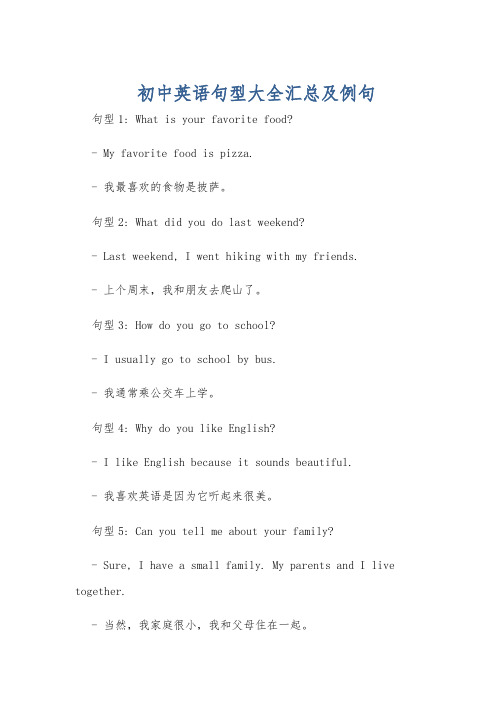
初中英语句型大全汇总及例句句型1: What is your favorite food?- My favorite food is pizza.- 我最喜欢的食物是披萨。
句型2: What did you do last weekend?- Last weekend, I went hiking with my friends.- 上个周末,我和朋友去爬山了。
句型3: How do you go to school?- I usually go to school by bus.- 我通常乘公交车上学。
句型4: Why do you like English?- I like English because it sounds beautiful.- 我喜欢英语是因为它听起来很美。
句型5: Can you tell me about your family?- Sure, I have a small family. My parents and I live together.- 当然,我家庭很小,我和父母住在一起。
句型6: What is your dream job?- My dream job is to become a doctor and help people.- 我的梦想工作是成为一名医生,帮助他人。
句型7: Have you ever been to the Great Wall?- Yes, I have been to the Great Wall. It was amazing!- 是的,我去过长城,那里很棒!句型8: What do you like to do in your free time?- In my free time, I like to read books and listen to music.- 我空闲时间喜欢读书和听音乐。
句型9: Where is your favorite place to visit?- My favorite place to visit is Paris because of its beautiful architecture.- 我最喜欢去的地方是巴黎,因为那里有美丽的建筑。
初中三年英语语法知识归纳最全的中考英语语法大全汇总

一.句子结构及句型1.简单句:由一个主语和一个谓语组成的句子。
2.并列句:由两个或多个相互独立的简单句连接而成的句子。
3.复合句:由一个主句和一个或多个从句连接而成的句子。
4.疑问句:用来提问的句子,常以助动词、系动词或情态动词开头。
5.祈使句:用来表示命令、请求、建议等的句子。
6.感叹句:表示强烈的感情、情绪或意义的句子。
二.时态的用法1.一般现在时:表示经常性或客观事实。
2.一般过去时:表示过去一些时间发生的动作或状态。
3.现在进行时:表示现在进行或暂时的动作。
4.过去进行时:表示过去时进行或暂时的动作。
5.将来时:表示将来要发生的动作或存在的状态。
三.语态的用法1.一般现在时的被动语态:主语是动作的承受者。
2.一般过去时的被动语态:主语是动作的承受者。
3.现在进行时的被动语态:主语是动作的承受者。
4.过去进行时的被动语态:主语是动作的承受者。
四.动词的用法1.及物动词:必须接宾语才能构成完整的意思。
2.不及物动词:不需要接宾语就能构成完整的意思。
3.能愿动词:包括情态动词和行为动词,用于表示能力、愿望、可能性等。
五.名词的用法1.可数名词:表示可以数的事物或物体。
2.不可数名词:表示不可数的抽象概念、物质或一类事物。
3.可数名词的数量表示:使用具体数字、数词、不定代词等。
六.代词的用法1.主格代词:在句子中作主语或表语。
2.宾格代词:在句子中作宾语或介词宾语。
3.物主代词:表示所有关系,用来修饰名词。
4.反身代词:表示动作反映到自己身上。
七.形容词的用法1.表示性质或特征的词汇。
2.修饰名词或代词。
3.用比较级和最高级表示程度或比较。
八.副词的用法1.表示时间、地点、方式、程度等。
2.修饰动词、形容词、副词和句子。
九.介词的用法1.表示时间、地点、方式不同的介词。
2.用于修饰名词或代词。
十.连词的用法1. 并列连词:连接两个并列的分句,如and, but, or等。
2. 从属连词:连接主句和从句,如when, because, if等。
初中英语五大基本句型
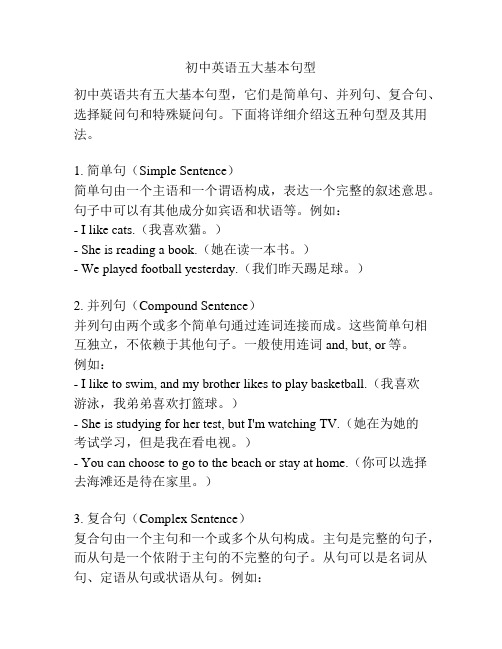
初中英语五大基本句型初中英语共有五大基本句型,它们是简单句、并列句、复合句、选择疑问句和特殊疑问句。
下面将详细介绍这五种句型及其用法。
1. 简单句(Simple Sentence)简单句由一个主语和一个谓语构成,表达一个完整的叙述意思。
句子中可以有其他成分如宾语和状语等。
例如:- I like cats.(我喜欢猫。
)- She is reading a book.(她在读一本书。
)- We played football yesterday.(我们昨天踢足球。
)2. 并列句(Compound Sentence)并列句由两个或多个简单句通过连词连接而成。
这些简单句相互独立,不依赖于其他句子。
一般使用连词and, but, or等。
例如:- I like to swim, and my brother likes to play basketball.(我喜欢游泳,我弟弟喜欢打篮球。
)- She is studying for her test, but I'm watching TV.(她在为她的考试学习,但是我在看电视。
)- You can choose to go to the beach or stay at home.(你可以选择去海滩还是待在家里。
)3. 复合句(Complex Sentence)复合句由一个主句和一个或多个从句构成。
主句是完整的句子,而从句是一个依附于主句的不完整的句子。
从句可以是名词从句、定语从句或状语从句。
例如:- I know that she is coming to visit us tomorrow.(我知道她明天要来看我们。
)- The book that I borrowed from the library is very interesting.(我从图书馆借的那本书很有趣。
)- We will go to the park if it doesn't rain tomorrow.(如果明天不下雨,我们会去公园。
中学初中英语语法——九大简单句基本句型
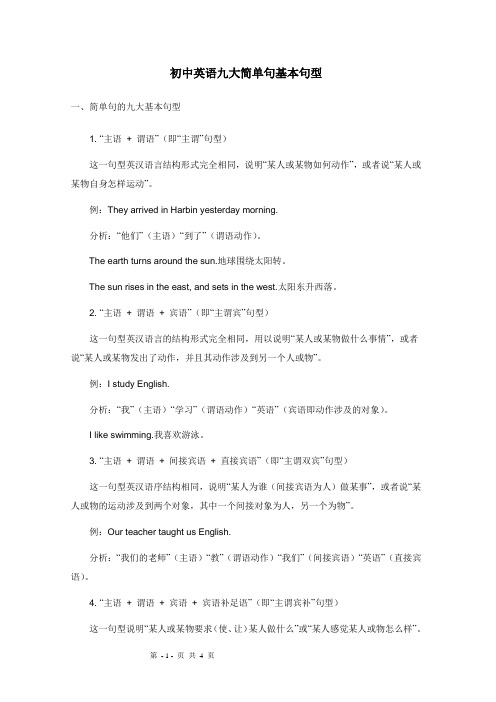
初中英语九大简单句基本句型一、简单句的九大基本句型1. “主语+ 谓语”(即“主谓”句型)这一句型英汉语言结构形式完全相同,说明“某人或某物如何动作”,或者说“某人或某物自身怎样运动”。
例:They arrived in Harbin yesterday morning.分析:“他们”(主语)“到了”(谓语动作)。
The earth turns around the sun.地球围绕太阳转。
The sun rises in the east, and sets in the west.太阳东升西落。
2. “主语+ 谓语+ 宾语”(即“主谓宾”句型)这一句型英汉语言的结构形式完全相同,用以说明“某人或某物做什么事情”,或者说“某人或某物发出了动作,并且其动作涉及到另一个人或物”。
例:I study English.分析:“我”(主语)“学习”(谓语动作)“英语”(宾语即动作涉及的对象)。
I like swimming.我喜欢游泳。
3. “主语+ 谓语+ 间接宾语+ 直接宾语”(即“主谓双宾”句型)这一句型英汉语序结构相同,说明“某人为谁(间接宾语为人)做某事”,或者说“某人或物的运动涉及到两个对象,其中一个间接对象为人,另一个为物”。
例:Our teacher taught us English.分析:“我们的老师”(主语)“教”(谓语动作)“我们”(间接宾语)“英语”(直接宾语)。
4. “主语+ 谓语+ 宾语+ 宾语补足语”(即“主谓宾补”句型)这一句型说明“某人或某物要求(使、让)某人做什么”或“某人感觉某人或物怎么样”。
例:He asked her to go there.分析:“他”(主语)“要求”(谓语动作)“她”(宾语即动作涉及的对象)“去那里”(补语—补充说明宾语应做什么)。
5. “主语+ have + 宾语”(即“拥有”句型)这一句型主要用于说明“某人或某物拥有什么(宾语,即有形或无形的资源)”。
初中生必须掌握的9大英语语法汇总

初中生必须掌握的9大英语语法汇总语法是针对英语语言进行研究后,系统地总结归纳出来的一系列语言规那么。
的精髓在于掌握语言的使用。
下面是为大家带来的初中生必须掌握的9大英语语法汇总,希望能帮到大家!一.情态动词can的用法can+动词原形,它不随主语的人称和数而变化。
1.含有can的肯定句:主语+can+谓语动词的原形+其他。
2.含有can的否认句:主语+can‘t+动词的原形+其他。
3.变一般疑问句时,把can提前:Can+主语+动词原形+其他?肯定答复:Yes,主语+can。
否认答复:No,主语+can’t.4.含有can的特殊疑问句:特殊疑问词+can+主语+动词原形+其他? IcanspeakEnglish.→Ican‘tspeakEnglish.→CanyouspeakEnglish →Whatcanyouspeak二.whattime和when引导的特殊疑问句1.询问钟点时用whattime,询问日期、月份、年份时用when。
2.What’sthetime?=Whattimeisit?现在几点了?3.时刻表达法:顺读法和逆读法。
顺读法:“钟点+分钟”直接读数字。
如:7:05sevenfive;8:16eightsixteen逆读法:借助介词past或to表示,要先说分再说钟点。
a.当分钟不超过30分钟时(包括30分钟),即<或=30,用past表示。
其结构为:“分钟+past+整点”意为“几点过几分”。
如:1:25twenty-fivepastoneb.当超过30分钟时,即>30,用to表示。
其结构为:“所差分钟(即60—所过分钟数)+to+下一个整点”,to译成“差”,差几分钟到几点。
如:4:38twenty-twotofivec.当分钟为30分钟用half表示,当分钟为15分钟用aquarter。
三.how引导的特殊疑问句1.how引导的特殊疑问句提问交通方式,其答语分三种情况:a.takea/an/the+交通工具(单数)b.by+交通工具(单数)c.on/in+限定词+交通工具---Howdoyougotoschooleveryday?---Itakeabustogotoschooleveryday./Igotoschoolbybuseveryday./Ig otoschoolonthebuseveryday.2.howfar用来提问距离,多远,其答语分为两种:(1)用长度单位表示:Itisfivekilometers.(2)用时间表示:It’stwentyminutes’walk.3.howlong用来提问时间,意为多久答复常用“for+段时”。
初中英语110个重要短语和句型汇总

初中英语110个重要短语与句型汇总1.put down 放下 shut down 把…关上cut down砍掉come down下来、落下slow down 减缓、放慢sit down坐下write down写下get down下来,降落2.after all毕竟。
终究after that于是。
然后day after day日复一日地one after another相继。
挨次soon after不久以后the day after tomorrow后天3。
come up with找到、提出catch up with赶上wake up弄醒、醒来send up发射open up开设、开办grow up长大pick up拾起、捡起hands up举手eat up吃光clean up 打扫干净give up doing sth。
=stop doing sth。
放弃做某事4.arrive at/in + n。
到达get to +n。
到达reach + n。
到达arrive / get +adv。
到达5.get…back退还,送回去。
取回give back归还come back回来at the back of在…的后面on the way (back)home在回家路上6。
at least至少at breakfast早餐时at desk在桌前at once立刻,马上at school 在上学at the same time同时at work在工作be good at=do well in 善长laugh at嘲笑not…at all一点也不at first起初at night在晚上at noon中午。
at the age of // when sb。
was…years old 在…岁时at last / in the end / finally 最后、终于。
at the beginning of the twenty-first century在21世纪初,at the end of 在…终点、结尾at the moment // now现在at the foot of在…脚下at Christmas在圣诞节at any moment 任何时候at times(sometimes)有时,偶尔at the doctor’s在医务室be bad at不善长7.for example例如for ever永远be good for对…有益be bad for对…有害for long=for a long time长期for short 简称be short for是…的简称TV is short for “television”8。
初中阶段主要句型的用法
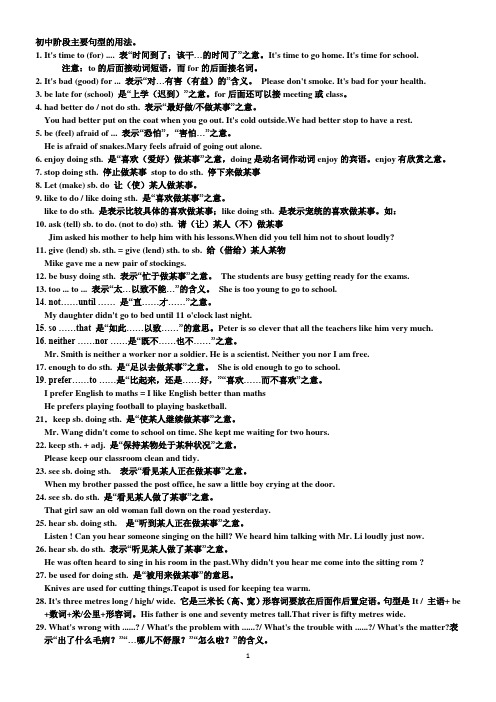
初中阶段主要句型的用法。
1. It's time to (for) .... 表“时间到了;该干…的时间了”之意。
It's time to go home. It's time for school.注意:to的后面接动词短语,而for的后面接名词。
2. It's bad (good) for ... 表示“对…有害(有益)的”含义。
Please don't smoke. It's bad for your health.3. be late for (school) 是“上学(迟到)”之意。
for后面还可以接meeting或class。
4. had better do / not do sth. 表示“最好做/不做某事”之意。
You had better put on the coat when you go out. It's cold outside.We had better stop to have a rest.5. be (feel) afraid of ... 表示“恐怕”,“害怕…”之意。
He is afraid of snakes.Mary feels afraid of going out alone.6. enjoy doing sth. 是“喜欢(爱好)做某事”之意,doing是动名词作动词enjoy的宾语。
enjoy有欣赏之意。
7. stop doing sth. 停止做某事stop to do sth. 停下来做某事8. Let (make) sb. do 让(使)某人做某事。
9. like to do / like doing sth. 是“喜欢做某事”之意。
like to do sth. 是表示比较具体的喜欢做某事;like doing sth. 是表示宠统的喜欢做某事。
如:10. ask (tell) sb. to do. (not to do) sth. 请(让)某人(不)做某事Jim asked his mother to help him with his lessons.When did you tell him not to shout loudly?11. give (lend) sb. sth. = give (lend) sth. to sb. 给(借给)某人某物Mike gave me a new pair of stockings.12. be busy doing sth. 表示“忙于做某事”之意。
初中英语50个必考句型汇总
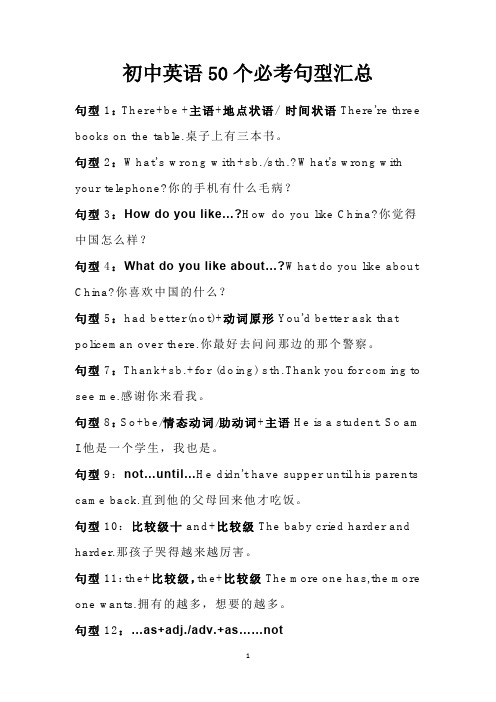
初中英语50个必考句型汇总句型1:There+be +主语+地点状语/ 时间状语There're three books on the table.桌子上有三本书。
句型2:What's wrong with+sb./sth.?What's wrong with your telephone?你的手机有什么毛病?句型3:How do you like…?How do you like China?你觉得中国怎么样?句型4:What do you like about…?What do you like about China?你喜欢中国的什么?句型5:had better(not)+动词原形You'd better ask that policeman over there.你最好去问问那边的那个警察。
句型7:Thank+sb.+for (doing) sth.Thank you for coming to see me.感谢你来看我。
句型8:So+be/情态动词/助动词+主语He is a student. So am I.他是一个学生,我也是。
句型9:not…until…He didn't have supper until his parents came back.直到他的父母回来他才吃饭。
句型10:比较级十and+比较级The baby cried harder and harder.那孩子哭得越来越厉害。
句型11:the+比较级,the+比较级The more one has,the more one wants.拥有的越多,想要的越多。
句型12:…as+adj./adv.+as……notas(so)+adj./adv.+as…Last Sunday the weather was not so wet as it is today.上个星期天的天气不如今天的天气潮湿。
初中英语语法五大基本句型

第一章五大基本句型一、主语+不及物动词(S+vi。
)Birds fly。
鸟会飞.The birds are flying over the building. 那些鸟正飞过大楼上空.He sits in the back row. 他坐在后排。
二、主语+及物动词+宾语(S+vt。
+O)My brother studies history. 我哥哥研究历史.I put the newspaper on the table. 我把报纸放在了桌上。
She only wants an apple. 她只想要一个苹果.三、主语+系动词+表语(S+v.+P)The flowers are very beautiful。
这些花非常漂亮.The music sounds very sweet。
这个音乐听起来很甜美。
I feel sleepy today. 我今天感觉很累.四、主语+及物动词+简接宾语+直接宾语(S+vt. +IO+DO)Our English teacher often tells us stories in English。
我们的英语老师经常用英语给我们讲故事。
I will find you a good chance as long as you won’t lose heart。
只要你不失去信心,我会给你找个好机会的。
My parents bought me a nice Christmas present。
我父母为我卖了一件精美的圣诞礼物。
五、主语+及物动词+宾语+宾语补足语(S+vt.+O+C)They made her happy. 他们使她高兴。
They painted the door red。
他们把门漆成了红色。
I can hear someone playing the violin next door. 我听见有人在隔壁拉小提琴。
第二章句型成分:主语和宾语一、名词1、名词的数名词分为可数名词和不可数名词。
初中英语语法大汇总

今天我们整理了初中的重要语法知识,希望能够对大家有所帮助~一. 动词be(is,am,are)的用法我(I)用am, 你(you)用are,is跟着他(he)、她(she)、它(it)。
单数名词用is,复数名词全用are。
变否定,更容易,be后not加上去。
变疑问,往前提,句末问号莫丢弃。
还有一条须注意,句首大写莫忘记。
二. this,that和it用法(1)this和that是指示代词,it是人称代词。
(2)距离说话人近的人或物用this, 距离说话人远的人或物用that。
如:This is a flower. 这是一朵花。
(近处)That is a tree. 那是一棵树。
(远处)(3)放在一起的两样东西,先说this, 后说that。
如:This is a pen. That is a pencil. 这是一支钢笔。
那是一支铅笔。
(4)向别人介绍某人时说This is…, 不说That is…。
如:This is Helen. Helen, this is Tom. 这是海伦。
海伦,这是汤姆。
(5)This is 不能缩写, 而That is可以缩写。
如:This is a bike. That’s a car. 这是一辆自行车。
那是一辆轿车。
(6)打电话时,介绍自己用this, 询问对方用that。
如:—Hello! Is that Miss Green? 喂,是格林小姐吗?—Yes, this is. Who’s that? 是的,我是,你是谁?注意:虽然汉语中使用“我”和“你”,但英语中打电话时绝不可以说:I am…, Are you…?/Who are you?(7)在回答this或that作主语的疑问句时, 要用it代替this或that。
如:①—Is this a notebook? 这是笔记本吗?—Yes, it is. 是的,它是。
②—What’s that? 那是什么?—It’s a kite. 是只风筝。
初中英语重点句型归纳
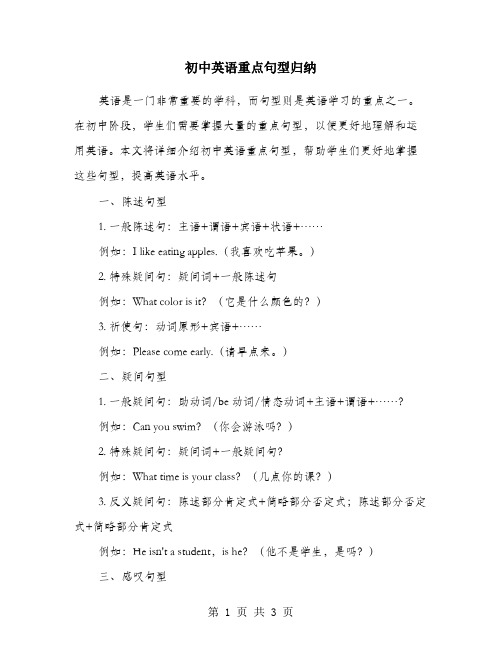
初中英语重点句型归纳英语是一门非常重要的学科,而句型则是英语学习的重点之一。
在初中阶段,学生们需要掌握大量的重点句型,以便更好地理解和运用英语。
本文将详细介绍初中英语重点句型,帮助学生们更好地掌握这些句型,提高英语水平。
一、陈述句型1. 一般陈述句:主语+谓语+宾语+状语+……例如:I like eating apples.(我喜欢吃苹果。
)2. 特殊疑问句:疑问词+一般陈述句例如:What color is it?(它是什么颜色的?)3. 祈使句:动词原形+宾语+……例如:Please come early.(请早点来。
)二、疑问句型1. 一般疑问句:助动词/be动词/情态动词+主语+谓语+……?例如:Can you swim?(你会游泳吗?)2. 特殊疑问句:疑问词+一般疑问句?例如:What time is your class?(几点你的课?)3. 反义疑问句:陈述部分肯定式+简略部分否定式;陈述部分否定式+简略部分肯定式例如:He isn't a student,is he?(他不是学生,是吗?)三、感叹句型1. What+a/an+形容词+可数名词单数+主语+谓语!例如:What a beautiful flower it is!(多么美丽的花啊!)2. How+形容词/副词+主语+谓语!例如:How fast he runs!(他跑得多快啊!)四、强调句型It is/was+被强调部分(主语/宾语/状语)+that/who+其他部分。
这个句型用于强调句中,强调某个成分时,一定要注意语序和时态。
被强调部分可以是主语、宾语或状语等。
强调主语时,可以用“Itis/was the +名词词组”来表达;强调宾语时,可以用“It was/is the (an) +形容词+名词词组+that”来表达;强调状语时,则要注意改变句子结构和时态。
这个句型在使用时需要注意一些固定用法和特殊用法。
初中英语语法汇总_五种基本句型

初中英语语法汇总五种基本句型五种基本句型2 五种基本句型句子是由主语、谓语动词、表语、宾语、宾语补足语等组成的,依其组合方式可分为五种基本句型,如下表所示:注意句子成分的表示法S:Subject(主语)V:Verb(动词)O:Object(宾语)P:Predicative(表语)OC:Object Complement(宾语补足语)五种基本句型见下表种类句型主语谓语部分S. 谓语动词V. 表语P. 宾语O. 宾语补足语OC.第1种S+V We work.(不及物)第2种S+V+O He plays(及物) the piano第3种S+V+P WE are(系动词) students第4种S+V+ino(间接宾语) She gave(及物) me a pen+DO(直接宾语)第5种S+V+O+OC He made(及物) the boy laugh1 第1种句型:主语+不及物动词:S+VBirds fly.鸟飞.----- ---主语谓语(不及物动词)He runs in the park.他在公园里跑.------ --------------主语谓语地点状语(不及物动词)此句型是《主语+不及物动词》构成句子的主体部分。
因为是不及物动词,后面当然不能带宾语了,但是可以有状语来修饰。
例如上面例句中的in thepark,是地点状语。
Class begins.(begin在句中是不及物动词)开始上课。
比较we begin Our class at eight.我们八点钟开始上课。
该句属于第2种句型,begin在句中是及物动词,由此可见有些动词既可作及物动词也可以作不及物动词。
必背!只能当不及物动词的词walk 步行swim 游泳happen(take place)发生go去come来work 工作laugh 笑stay呆在……arrive 到达2 第2种句型:主语+及物动词+宾语:S+V+OMy father read the book.我父亲读过那本书.----------- ------ ----------主语谓语(及物动词) 宾语注意有些不及物动词后面加上介词就可把它看成一个及物动词,后面就可以加宾语了。
初中英语110个重要短语与句型汇总
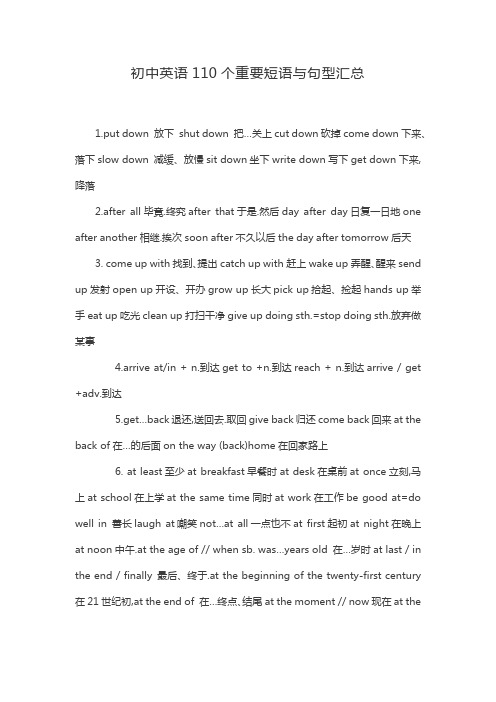
初中英语110个重要短语与句型汇总1.put down 放下shut down 把…关上cut down砍掉come down下来、落下slow down 减缓、放慢sit down坐下write down写下get down下来,降落2.after all毕竟.终究after that于是.然后day after day日复一日地one after another相继.挨次soon after不久以后the day after tomorrow后天3. come up with找到、提出catch up with赶上wake up弄醒、醒来send up 发射open up开设、开办grow up长大pick up拾起、捡起hands up举手eat up 吃光clean up打扫干净give up doing sth.=stop doing sth.放弃做某事4.arrive at/in + n.到达get to +n.到达reach + n.到达arrive / get +adv.到达5.get…back退还,送回去.取回give back归还come back回来at the back of在…的后面on the way (back)home在回家路上6. at least至少at breakfast早餐时at desk在桌前at once立刻,马上at school在上学at the same time同时at work在工作be good at=do well in 善长laugh at嘲笑not…at all一点也不at first起初at night在晚上at noon中午.at the age of // when sb. was…years old 在…岁时at last / in the end / finally 最后、终于.at the beginning of the twenty-first century在21世纪初,at the end of 在…终点、结尾at the moment // now现在at the foot of在…脚下at Christmas 在圣诞节at any moment任何时候at times(sometimes)有时,偶尔at the doctor's在医务室be bad at不善长7.for example例如for ever永远be good for对…有益be bad for对…有害for long=for a long time长期for short 简称be short for是…的简称TV is short for “television”8. come true实现come down下来come from=be from来自,出生于come in/into进入,进来come on赶快come over过来come along走吧,过来,快点,come and go来来去去come up上来come out出来,(花)开,(照片)冲洗出来9.even though=even if即使、虽然、尽管10. be pleased with对…感到满意be covered with被…覆盖be expected to do sth.被期望做某事be proud of 以…自豪speak highly of 称赞be afraid of害怕hear of听说(hear from sb.收到某人的来信)of cause=certainly当然可以plenty of= a lot of许多11.by the way顺便说by oneself单独,独自by the end of到…为至by the time(引起时间状语从句)到…的时候one by one依次by air / plane乘飞机by bus / train / car乘公共汽车/火车/轿车(catch a bus赶公交车get on / off the bus上/下车take a bus to…=go to …by bus乘车去)12.do / try one’s best尽力do one’s homework做家庭作业do (the/some) shopping购物do the cooking烹饪do some cleaning打扫do the / some washing洗衣服do sport做运动do with sb. / sth.处理well done干得好13.early in the morning一大早in the early spring初春in my early days 我幼年时期early bus早班车14.make a contribution to贡献给、捐献make a telephone call to sb. // ring sb. up // give sb. a call // phone sb.给某人打电话connect…to…把…与…连接起来be close to靠近(某地) give birth to生(孩子) lose to sb.输给sb.15.either…or…或者…或者..on either side of the street街道任何一边(on each side of the street街道每一边on both sides of the street街道两边)16.keep doing sth.不停地做某事(表示状态继续)keep on doing sth. 坚持做某事(表示动作反复进行)practice doing sth.练习做某事enjoy doing sth.喜欢做某事finish doing sth.做完某事go on doing sth.继续做某事(同一件事)17.go on to do sth.接着做某事(另一事) go straight along 沿着…一直往前走, go down下降, go for a walk散步, go over复习, go shopping买东西, go to the cinema去看电影, go well进展顺利, go off to动身前往, go out外出, go to work去上班, go up上升, want a go 想试一试18. think about考虑(think of 认为、想起、考虑、想到think over仔细考虑think out想出)talk about谈论, worry about担心, How / What about…?…怎么样?19.borrow…from …从…借….(lend…to…把…借给…)from door to door挨家挨户, from time to time时时, from now on 从今以后, from then on 从那以后, be different from与…不同, learn…from…向…学习20.get dressed穿衣, get into进入, get / be lost丢失, get off / on下/上车, get on well with sb.与某人相处得好, get out of从…出来, get ready for +n.为…做准备, get ready to do sth.准备做某事, get / go to sleep (fall asleep)入睡, (be asleep睡着) get warm 变暧, get well康复, get a chance 有机会、得到机会21. look for 寻找, wait for等候, look after=take care of照看, look like看起来像, look over检查,复习, look out小心,从里向外看, look the same 看起来一样, look up向上看,查单词, look around环视look forward to期望, look through温习,检查22. set off 出发、动身, put off 推迟, keep off 避开、不靠近…drop off 放下(某物),turn off关, jump off跳离, take off脱(衣),(飞机)起飞23. half a kilo半千克, half an hour半小时, in half分成两半, half of the day半天24. do eye exercises做眼保健操, do morning exercises做早操take (more) exercise (多)参加体育锻炼, an exercise book练习本25. take part in参加, hand in上交, in hospital住院, in surprise吃惊地, in the sun在阳光下, in trouble处于困境, in a minute / moment马上26. leave for…动身去某地27 feed on 以…为主食, live on继续活着, base on以…为根据, carry on坚持、继续下去, and so on 等等, on the other hand另一方面, on foot步行28.be famous for以..著名, be excited about +n./V-ing对…感到兴奋, be interested in 对…感兴趣, be born出生, be busy with sth.—be busy doing sth.忙于…be amazed at 对..感到惊讶29.move away移开, move to(搬)移到30.search the Internet上网31.make sure 确信, make a dialogue编对话, make a mistake犯错误(by mistake由于疏忽) make a noise吵闹, make faces做鬼脸, make friends (with)和..交朋友, make room for给..让地方, make tea沏茶, make money赚钱, make a decision作出决定ed to do sth过去常常做某事, be used to doing sth.习惯于做某事33. leave sth+介词短语“把……忘记在某处”34.forget to do sth.忘记做某事, encourage sb. to do sth.鼓励某人做某事, decide to do sth.决定做某事, allow sb. to do sth.允许某人做某事35.hear sb. to do (doing)sth.听见某人做某事36.help sb. (to) do sth .//help sb. with sth. 帮助某人做某事, with one’s help在某人的帮助下, with pleasure乐意37.the summer holiday(s)暑假the winter holiday(s)寒假38.step into走进, pour into倒入…39.in the first第一, for the first time第一次, at first起初, a firs t language母语, first of all首先40.leave a message for sb.给某人留条, give / take sb. a message给某人捎口信想学习更多英语知识,请关注口袋英语aikoudaiyy41. take photos / pictures 照像, take away拿走, take out取出(work out算出) take care当心, take medicine 服药take one's temperature 量体温, take one's time别着急, take a walk散步, take place发生42. learn by oneself / teach oneself自学, learn by heart背熟43. a year and a half (one and a half years ) 一年半44.have a try尝试,努力, try out尝试、试验, find out / about找出,查明, have a good / wonderful / great / time玩得开心, have a (bad) cold(重)感冒, have a meeting / walk / watch开会/散步/比赛, have sports进行体育活动, have nothing / sth. to do with与..无(有)关, have no idea不知道, have (one's) medicine服药45. offer sb. sth.给某人提供某物46.win first prize获一等奖47.all over the world= around the world =throughout the world全世界48. all kinds of 各种各样的49. neither…nor 既不…也不….50. not only …but also …不但…而且, both…and ……和…都51. the more , the better 越多越好52. all one’s life 一生53. as soon as 一…就…as soon as possible尽可能早地、尽快as well = too也, as much as至多, as little as至少, regard …as 把…当作…, as if 好像54. no matter 无论…55 ever since 从那以后,此后一直56.so far 到目前为止, or so大约57. another two hours (=two more hours )又(再) 2个小时58. three times a week一周三次59. the number of…的数量a (large / good) number of / large numbers of / many许多60.less than少于, less and less 越来越少61.…is another way of saying…什么是..的另一说法Quick is another way of saying fast. Bike is short for bicycle.62. not…until…直到…才…63.be like像, feel like +n./V-ing想要, like best最喜欢, would like to 想要64.the 24 hour clock 24小时制65.wash away冲走,run away逃跑, take away带走66.before long不久, long before / ago很久以前, for long =for a long time长期, no longer = not. .any longer不再67.more or less = about或多或少,大约more than = over多于,超过68.every year每年, every four years每隔四年, every other day每隔一天, everyday English / life日常英语/生活69. next to紧挨着, next door隔壁,邻居, next year明年, next time下次70.receive / get / have a letter from sb. = hear from sb 收到某人的来信71.on show = on display展览72.be filled with / be full of充满…73. thank to =because of由于74.some day =one day(将来)某一天, all day终日, day and night 日日夜夜, ina day or two一两天内in the old days从前,旧社会, from day to day (day after day)日复一日, the day before yesterday前天, the day after tomorrow后天, Tree Planting Day植树节, Women’s Day 妇女节75. keep / stop / prevent…(from) doing sth.防止(阻止)…做某事, stop to do sth.停下来去做某事, stop doing sth.停止做某事76.nice and +adj. = very +adj.很,非常77. a place (places) of interest 名胜78.three quarters of the information on the Internet因特网上四分之三的信息, two thirds of the books三分之二的书79. credit card信用卡80. the increasing population增长着的人口81 a path of travel旅行路线82 . point at / to指向83. by sea = by ship乘船, by the sea = on the sea 在海边, at sea在海上84. set one’s mind to do sth.一心想做某事85 .multiply…by…乘以…86. See you!再见You see.你知道,你明白,你瞧, Let me see.让我想想, see sb. off给某人送行, see a / the doctor看病, see sb. do / doing sth.看见某人做某事87 some…others一些(人,物)…其他(人,物) one…another一个..另一个(三者或以上) one…the other一个…另一个(总数二个)88. be worn out穿旧,磨坏, check out核实,检查, write out写出, take sth. out of从…拿出/取出某物89. in this way用这种方法, in a few year's time几年以后, in space 在太空, in and out of class在课内课外, in the last fifteen minutes在最后十五分钟里, in the second half 在下半场, later in one's life在某人后半身, in the air在空中, in the open air在户外90.give sb. an injection给某人打针, get an injection打针91.have been to去过某地, have gone to到某地去了92.here + be+ 名词+ for+某人( Here is a letter for you.这儿有你的一封信.)93.be far behind +某人(He is far behind others. 他落后于别人)94. one of + adj.最高级+复数名词95. take +某物+with +某人(You' d better take an umbrella with you.你最好带上雨伞)96. prefer to= like…better than宁愿,更喜欢prefer + V-ing (to do sth.) ( I prefer doing (to do) it myself .我喜欢自己做那件事). Would / should等情态动词+ prefer +不定式. (I would prefer to do it myself.我宁愿自己做那件事) , prefer +名词(v-ing) + to+名词(v-ing) (I prefer learning English to playing football.我愿意学英语而不愿踢足球) ; prefer +不定式(名词)+ rather than + 不带to的不定式, (Iprefer to walk there rather than go by bus.我喜欢走着去那里,而不愿乘车) , prefer + 名词(代词) to do sth. (We prefer her not to come.我们宁愿她不来)97. 人+ spend +time (money) +(in) doing sth. (I spent over two hours (in) finishing my homework.我花了两个多小时完成家庭作业.) , 人+ spend + time (money) + on +名词, (He spent 1,000 on the TV set .他花了一千元买电视机). 人+ pay + money +for +sth. ( He paid ten Yuan for the book .他花了10元钱买那本书.) It + takes (will take, / took…) + sb. + time (money) + to do sth. (It'll take you only ten minutes to get there by bus.乘车去那里只花你10分钟). 物+ cost + (sb.) + money, (The dictionary cost me 20 Yuan .我花20元钱买了那本词典)98. do with + sb. / sth. (What have you done with the pork ? 那些肉你怎么处理了?)99. mind + if 从句, (Do you mind if I open the window?我开窗你不反对吧?) mind + V-ing, (Would you mind turning on the TV?打开电视你不反对吧?)100. what…for? / why…? (What do you learn English for? = Why do you learn English?)101. need + 名词(v-ing), (The students need some help.学生们需要帮助.This pair of shoes needs mending.这双鞋需要修理)102. “be used for+ 名词(v-ing),”被用来做.. (A writing brush is used for writing.) “be used as+名词”, 被作为…使用(English is used as the first language in none of these countries. ) “be used by+动作执行者”, 被…使用,103.be made of 由…制造(This table is made of wood .这张课桌是木制的) be made from由…制成(This kind of paper is made from wood . 这种纸是用木材制成的) be made in+地点, “某地制造”(These cars are made in Germany) be made by+人, “由谁制造的”(This kite is made by Kate . ) 104. more developed countries发达国家, less developed countries不发达国家, developing countries发展中国家105.be worth + money (V-ing),值…钱.值得做…This car is worth more than two million Yuan in China. This book is well worth reading.这本书很值得一读.106. the Summer Palace颐和园, Tian'anmen Square 天安门广场, the Palace Museum故宫, the Great Hall of the People人民大会堂, the Temple of Heaven天坛, the Great Green Wall绿色长城, PLA中国人民解放军, PRC中华人民共和国, the Party中国共产党, the League共青团, Peking Opera京剧107 a digital camera数字照相机, a doctor for animals = an animal doctor动物医生108. so + 形/副+that 从句, (The place is so cold that nothing can grow in winter .这地方太冷,冬天什么都不长) so + many / few+ 复数名词+that 从句(He has so many books that I don’t know which one to borrow. 他有那么多书,我不知道借哪一本) so + much / little+ 不可数名词+that从句(She has so little money that she can’t buy anything .她钱太少,什么也买不到.) so+ 形容词+a / an +单数名词+that从句(This is so good a book that all of us like readingit ) , such +a / an+ 形容词+单数名词+ that从句(This is such an interesting story that all of us like it) , such +形容词+复数名词+that从句. such +形容词+不可数名词+that从句(It is such fine weather today that many children are playing outside)109 .tell sb. about sth.告诉某人关于某事, tell sb. +从句, tell sb. to do sth.让某人做某事, tell a lie说谎, tell a story讲故事, thank you for +n ./V-ing 谢谢你…too + adj. / adv. + to + v.太…而不能, too much(修饰名词)太多,过分, much too(修饰adj./adv.)太110. hope / wish+不定式(或从句), wish sb. to do sth. What do you mean by…?= What does…mean?…是什么意思?。
初中英语种基本句型汇总
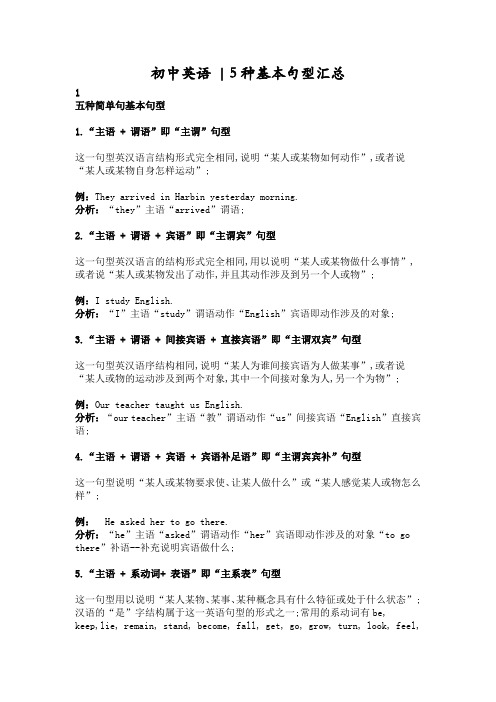
初中英语| 5种基本句型汇总1五种简单句基本句型1.“主语 + 谓语”即“主谓”句型这一句型英汉语言结构形式完全相同,说明“某人或某物如何动作”,或者说“某人或某物自身怎样运动”;例:They arrived in Harbin yesterday morning.分析:“they”主语“arrived”谓语;2.“主语 + 谓语 + 宾语”即“主谓宾”句型这一句型英汉语言的结构形式完全相同,用以说明“某人或某物做什么事情”,或者说“某人或某物发出了动作,并且其动作涉及到另一个人或物”;例:I study English.分析:“I”主语“study”谓语动作“English”宾语即动作涉及的对象;3.“主语 + 谓语 + 间接宾语 + 直接宾语”即“主谓双宾”句型这一句型英汉语序结构相同,说明“某人为谁间接宾语为人做某事”,或者说“某人或物的运动涉及到两个对象,其中一个间接对象为人,另一个为物”;例:Our teacher taught us English.分析:“our teacher”主语“教”谓语动作“us”间接宾语“English”直接宾语;4.“主语 + 谓语 + 宾语 + 宾语补足语”即“主谓宾宾补”句型这一句型说明“某人或某物要求使、让某人做什么”或“某人感觉某人或物怎么样”;例:He asked her to go there.分析:“he”主语“asked”谓语动作“her”宾语即动作涉及的对象“to go there”补语--补充说明宾语做什么;5.“主语 + 系动词+ 表语”即“主系表”句型这一句型用以说明“某人某物、某事、某种概念具有什么特征或处于什么状态”;汉语的“是”字结构属于这一英语句型的形式之一;常用的系动词有be, keep,lie, remain, stand, become, fall, get, go, grow, turn, look, feel,seem, smell, sound, taste, 等;例:I am a teacher. 我是一名老师分析:“I”主语“am”系动词“a teacher”表语—即表明主语的身份;2句子成分名词解释1.主语:句子所陈述的对象;2.谓语:主语发出的动作;一般是有动作意义的动词;3. 宾语:分为动词宾语和介词宾语,属于动作的承受者;4. 系动词:表示状态或状态变化的动词,没有实际的动作意义;如 be, 感官系动词look, sound, smell, taste 和 feel、保持类系动词keep, stay 和 remain、状态变化类系动词become、get、turn 和 go等;5. 表语:紧跟系动词后面的成分;6. 定语:修饰名词或代词的成分;7. 状语:修饰形容词、副词、动词或句子的成分;8. 补语:分为宾语补足语和主语补足语;是对宾语和主语的补充说明,与其有主动或被动的逻辑关系;例如:You should keep the room clean and tidy.你应该让屋子保持干净整洁;You是主语, should keep是谓语,the room是宾语,clean and tidy是宾语补足语;This kind of food tastes delicious.这种食物吃起来很可口;This kind of food是主语, tastes是系动词, delicious是表语;注意:主语、谓语、宾语、系动词、表语、补语是一个句子的主干成分;定语和状语是一个句子的修饰性成分;。
- 1、下载文档前请自行甄别文档内容的完整性,平台不提供额外的编辑、内容补充、找答案等附加服务。
- 2、"仅部分预览"的文档,不可在线预览部分如存在完整性等问题,可反馈申请退款(可完整预览的文档不适用该条件!)。
- 3、如文档侵犯您的权益,请联系客服反馈,我们会尽快为您处理(人工客服工作时间:9:00-18:30)。
初中英语句型用法汇总
一.主(Subject)+系(Link verb)+表(Predicative)
主语:名词、代词、V-ing、to do、从句
表语:名词、代词、V-ing、to do、从句;
V-ed ( prep+n/pron)、
prep+n/pron、adj(prep+n/pron)、adv(prep+n/pron)
(除了动词原形以外,一切皆可)
系动词,有三类,我得记住
感:feel, smell, taste, sound, look
变:become, go(朝坏的方向变化), come, turn, get, grow, fall
维:keep, stay, remain, be, seem/appear (to be),
turn out(to be), prove(to be)
二.主语+ 谓语(vi/[V])+(adv/prep+n/pron)
记住:在一般现在时态中,当主语为He/She/It/××时,其句中动词后应加上-s/-es。
Eg: He often plays basketball after school.
His father gets up early every day.
(我们称之为完全倒装句,一般只用于一般现在时态或一般过去时态)
Eg: Here came a bus.
Eg: Here it is./Here they are./Here you are.(给你。
)
三.主语+ 谓语(vt/[VN])+宾语
四.主语+谓语(vt /[VNN])+ 宾语+宾语
(物直人间。
通常情况下,双宾语,是可以拆开,单独与动词结合的)
五.主语+谓语(vi/[VNadj…])+宾语+宾补(宾补一定要与宾语有关系)
现将五个基本句型,合并其时态及语态,构成以下3×3×2-1= 17个结构。
1. A.一般现在时态(以说话人的说话时间为基准,将时间向前向后推移的一
段时间内,老是、常常、时而做某事,即为行为的惯常性、规律性、真理性,这种情况下所采用的时态。
)
He/She/It/××+is+表语.
He is tall and strong.
His grandfather(××)is generous and broad-minded.(他祖父慷慨大方,心胸宽广。
)
除了He/She/It/××以外,则用are
They are the students in GaoHe Senior High School.
He/She/It/××+ V-s/V-es+….
He, sometimes, plays basketball with his classmates after school.
The man named Tom plays cards with his friends in his spare time.
除了He/She/It/××以外,则直接用动词本身即可。
They often help the old man with his housework.
被动语态
原宾为主+被动结构+(by+原主)+其余.
He/She/It/××+ is + V-ed+(by+原主)+…
The naughty (淘气的)boy is often
beaten by his father.(那个淘气包常常挨其父亲的打。
)
I +am +V-ed+(by+原主)+…
I am trained by my father.
除了He/She/It/××/I以外,则:
主语+are+V-ed+( by+原主)+…
Measures are taken to avoid it when something dangerous happens.
B.现在进行时态
He/She/It/××+ is+V-ing+….
Now, he is listening to the music he enjoys with a pair of earphones.
除了He/She/It/××以外,则:
主语+ are + V-ing+…
We are making preparations for the coming examination.
被动语态
He/She/It/××+ is+being +V-ed+(by+原主)+…
I am +being +V-ed+(by+原主)+…
主语+ are + being +V-ed+(by+原主)+…
C.现在完成时态(表示过去所做的事情对现在造成的影响,即强调过去的事实所带来的结果。
)
He/She/It/××+has+V-ed+…
The old man has been away from the city since his son found and took him back home.
除了He/She/It/××以外,则:
主语+have +V-ed +…
They have finished their given work.
被动语态
He/She/It/××…
除了He/She/It/××以外,则:
主语…
2. A.一般过去时态(表示在过去某一时间,做了某一具体的事情,即强调过
去的某一事实本身。
)
若为系表结构的句子:
He/She/It/××/I +was +表语.
I was once the mayor in AnQin.
除了He/She/It/××/I以外,则:
主语+ were+表语.
They were very outgoing when I met him for the first time.
其余的则:
主语+动词的一般过去式+…
(通常是在原形动词的后面加上-ed构成,不规则动词的过去式,有其固定形式,我们得加以记忆。
)
被动语态
He/She/It/××/I +was+V-ed+(by+原主)+…
除了He/She/It/××/I以外,则:
主语+ were+V-ed+(by+原主)+…
B.过去进行时态
He/She/It/××/I+ was +V-ing+…
He was watching TV with his brother at home when I got to his house.(我到他家的时候,他在家与他的弟弟看电视。
)
除了He/She/It/××/I以外,则:
主语+ were +V-ing+…
They were fighting against each other when the police arrived.(警察到时,他们正在相互殴打。
)
被动语态
He/She/It/××/I+ was+being+V原主)+…
除了He/She/It/××/I以外,则:
主语原主)+…
C.过去完成时态(有两过去时间,形成过去的时间差)
主语+had +V-ed+…
The train had left the station before I arrived that day.(那天,火车驶出车站后,我才到。
/那天,我还未到车站,火车就开走了。
)
被动语态
主语原主)+…
3. A.一般将来时态
I/We shall+ 原形动词+…
被动语态
原主)+…
主语(也可包括I/We)+will+原形动词+…
被动语态
主语(也可包括I/We)原主)+…B.将来进行时态
主语+will+be+V-ing+…
This time next year, we will be studying in universities.
无被动语态
C. 将来完成时态(有两将来时间,形成将来的时间差)主语+will +have +V-ed+…
被动语态
主语原主)+…。
